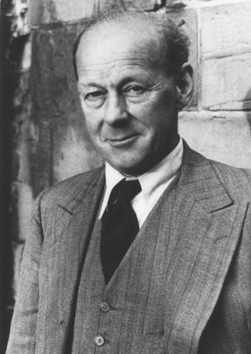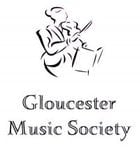History
MUSIC SOCIETGl
A befisto

Herbert Sumsion was appointed organist of Gloucester Cathedral in 1928. Prior to this he had spent 3 years teaching at the Curtis Institute in Philadelphia. He was a very able pianist and while there took the opportunity to play and compose chamber music. After his return to Gloucester he befriended another music lover, Dr Arnold Alcock, chief surgeon at the Gloucester Royal Hospital. It was in Alcock’s house at 9 College Green that he began to arrange musical evenings and encourage other musicians to play chamber music with him. These events took place in a large drawing room on the 1st floor – the venue which some years earlier had witnessed the first informal play-through of Elgar’s Violin Concerto with Willie Read, the famous leader of the LSO, on the violin, with the composer at the piano. And it was there in 1929 that the Gloucester Music Society was born, albeit in an informal way.
Sumsion was Music Adviser to the Society until 1967, often acting as accompanist at the concerts which included many of the most renowned artists of the day, and with Dr Alcock acting as Chairman. When both Dr Sumsion and Dr Alcock retired in 1967 the position of Chairman went to George Budge and that of Music Adviser to John Sanders, who had replaced Dr Sumsion as Cathedral Organist that year. In 1981 John Sanders took over the roles of both Chairman and Music Adviser on the retirement of George Budge. After 29 years as Music Adviser and 15 years as Chairman/Music Adviser, Dr Sanders retired in 1996 and was succeeded by Mr Anthony Boden then by the present Chairman, Christine Talbot-Cooper in 2001.
Early concerts took place in the old Ribston Hall School and attracted large audiences, with subsequent venues including the new Ribston Hall, the Guildhall, Denmark Road High School, the Cathedral Chapter House, and St Mary de Lode Church. The2016/2017 season took place once again in the Chapter House at Gloucester Cathedral with the concert day changing from Thursday evenings to Saturday afternoons. There were further changes for the 2017/2018 season when concerts moved to Sunday afternoons in the Ivor Gurney Hall adjacent to the Cathedral.
Competition from Cheltenham and Painswick was always a problem and the Society relied heavily on grants from such organisations as the City and County Councils, South West Arts and various trusts such as the Langtree and Summerfield. A scheme operated with County and City Education authorities whereby artists giving a concert in the evening would give another in the afternoon for school children. There was also a scheme for older children to attend the evening concerts with their teachers at a subsidised rate. When the City authority was phased out these schemes became more difficult to organise, and as pressures on school time and homework became more acute, finally had to be abandoned. In recent years a number of artists have undertaken afternoon workshops for young people who have then taken part in the evening concert. The Society has also provided lunchtime concerts for adults with learning difficulties, also offering them free admission to evening concerts.
When it became apparent that there was to be no funding forthcoming for the 2002/3 programme, an ambitious concert programme with many related events was planned in the hope of attracting lottery funding and an award was subsequently made by the Regional Arts Lottery Programme. It was hoped that the quality of both artists and programmes would bring in a good audience for the concert series, together with offers of future sponsorship. Although this has proved to be more difficult than anticipated, the Society continues to provide inspiring and innovative programmes performed by internationally renowned musicians for chamber music lovers in Gloucester and surrounding districts. In recent years the Society has become known for commissioning and premiering new works as well as championing English composers past and present.
Christine Talbot-Cooper with thanks to the late Dr John Sanders OBE
Herbert Sumsion was appointed organist of Gloucester Cathedral in 1928. Prior to this he had spent 3 years teaching at the Curtis Institute in Philadelphia. He was a very able pianist and while there took the opportunity to play and compose chamber music. After his return to Gloucester he befriended another music lover, Dr Arnold Alcock, chief surgeon at the Gloucester Royal Hospital. It was in Alcock’s house at 9 College Green that ho arrange musical evenings and encourage other musicians to play chamber music with him. These events took place in a large drawing room on the 1st floor – the venue which some years earlier had witnessed the first informal play-through of Elgar’s Violin Concerto with Willie Read, the famous leader of the LSO, on the violin, with the composer at the piano. And it was there in 1929 that the Gloucester Music Society was born, albeit in an informal way.
Sumsion was Music Adviser to the Society until 1967, often acting as accompanist at the concerts which included many of the most renowned artists of the day, and with Dr Alcock acting as Chairman. When both Dr Sumsion and Dr Alcock retired in 1967 the position of Chairman went to George Budge and that of Music Adviser to John Sanders, who had replaced Dr Sumsion as Cathedral Organist that year. In 1981 John Sanders took over the roles of both Chairman and Music Adviser on the retirement of George Budge. After 29 years as Music Adviser and 15 years as Chairman/Music Adviser, Dr Sanders retired in 1996 and was succeeded by Mr Anthony Boden then by the present Chairman, Christine Talbot-Cooper in 2001.
Early concerts took place in the old Ribston Hall School and attracted large audiences, with subsequent venues including the new Ribston Hall, the Guildhall, Denmark Road High School, the Cathedral Chapter House, and St Mary de Lode Church. The2016/2017 season took place once again in the Chapter House at Gloucester Cathedral with the concert day changing from Thursday evenings to Saturday afternoons. There were further changes for the 2017/2018 season when concerts moved to Sunday afternoons in the Ivor Gurney Hall adjacent to the Cathedral.
Competition from Cheltenham and Painswick was always a problem and the Society relied heavily on grants from such organisations as the City and County Councils, South West Arts and various trusts such as the Langtree and Summerfield. A scheme operated with County and City Education authorities whereby artists giving a concert in the evening would give another in the afternoon for school children. There was also a scheme for older children to attend the evening concerts with their teachers at a subsidised rate. When the City authority was phased out these schemes became more difficult to organise, and as pressures on school time and homework became more acute, finally had to be abandoned. In recent years a number of artists have undertaken afternoon workshops for young people who have then taken part in the evening concert. The Society has also provided lunchtime concerts for adults with learning difficulties, also offering them free admission to evening concerts.
When it became apparent that there was to be no funding forthcoming for the 2002/3 programme, an ambitious concert programme with many related events was planned in the hope of attracting lottery funding and an award was subsequently made by the Regional Arts Lottery Programme. It was hoped that the quality of both artists and programmes would bring in a good audience for the concert series, together with offers of future sponsorship. Although this has proved to be more difficult than anticipated, the Society continues to provide inspiring and innovative programmes performed by internationally renowned musicians for chamber music lovers in Gloucester and surrounding districts. In recent years the Society has become known for commissioning and premiering new works as well as championing English composers past and present.
Christine Talbot-Cooper with thanks to the late Dr John Sanders OBE
ter Music Society
Sumsion was Music Adviser to the Society until 1967, often acting as accompanist at the concerts which included many of the most renowned artists of the day, and with Dr Alcock acting as Chairman. When both Dr Sumsion and Dr Alcock retired in 1967 the position of Chairman went to George Budge and that of Music Adviser to John Sanders, who had replaced Dr Sumsion as Cathedral Organist that year. In 1981 John Sanders took over the roles of both Chairman and Music Adviser on the retirement of George Budge. After 29 years as Music Adviser and 15 years as Chairman/Music Adviser, Dr Sanders retired in 1996 and was succeeded by Mr Anthony Boden then by the present Chairman, Christine Talbot-Cooper in 2001.
Early concerts took place in the old Ribston Hall School and attracted large audiences, with subsequent venues including the new Ribston Hall, the Guildhall, Denmark Road High School, the Cathedral Chapter House, and St Mary de Lode Church. The2016/2017 season took place once again in the Chapter House at Gloucester Cathedral with the concert day changing from Thursday evenings to Saturday afternoons. There were further changes for the 2017/2018 season when concerts moved to Sunday afternoons in the Ivor Gurney Hall adjacent to the Cathedral.
Competition from Cheltenham and Painswick was always a problem and the Society relied heavily on grants from such organisations as the City and County Councils, South West Arts and various trusts such as the Langtree and Summerfield. A scheme operated with County and City Education authorities whereby artists giving a concert in the evening would give another in the afternoon for school children. There was also a scheme for older children to attend the evening concerts with their teachers at a subsidised rate. When the City authority was phased out these schemes became more difficult to organise, and as pressures on school time and homework became more acute, finally had to be abandoned. In recent years a number of artists have undertaken afternoon workshops for young people who have then taken part in the evening concert. The Society has also provided lunchtime concerts for adults with learning difficulties, also offering them free admission to evening concerts.
